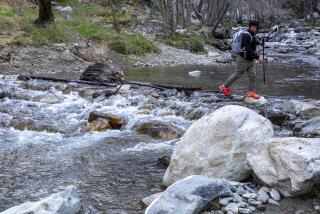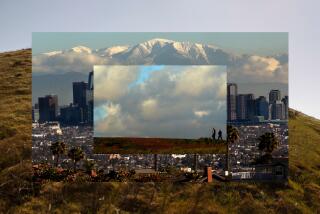Cyclists Have Another Hill to Climb : Recreation: Nonprofit group wants to preserve access to mountain trails for bicyclists.
Mountain bikers Alan Armstrong and Reese Vogel are blazing a trail of education and understanding.
Encounter either on a trail in the San Gabriel Mountains, and they probably will present a folding business card that reads, in bold black letters:
“There is a growing controversy over the use of mountain bicycles in the San Gabriel Mountains. Be part of the solution, not a cause of the problem.”
Armstrong, a welding instructor at Pasadena City College, and Vogel, a professional photographer, are active members of the Mt. Wilson Bicycling Assn., a nonprofit volunteer organization that works with the U.S. Forest Service in an effort to preserve access to mountain trails for cyclists.
Armstrong helped form the organization in 1985 after equestrian groups proposed excluding mountain bikes from the Mt. Wilson toll road, which begins near the Eaton Canyon Nature Center in Pasadena and travels eight miles to the top of Mt. Wilson.
The dirt road, which provides access to countless trails, is a recreational corridor for as many as 45,000 pedestrians, equestrians and cyclists each year, according to Paul Downing, a deputy forester stationed at Henninger Flats, 2.7 miles from the bottom of the road.
“All of those groups are compatible if people use common sense,” Downing said. “Most of the cyclists are very resonable people. But there is a small percentage that are on the wild side.”
Problems have surfaced when cyclists, having been given rides up Angeles Crest Highway to the top of Mt. Wilson, use the toll road strictly for downhill racing.
“It’s unfortunate that one person on a mountain bike with a devil-may-care attitude can have such a dramatic impact on other people’s enjoyment of the forest,” said Armstrong, who lives in Pasadena. “You have to keep educating the new people to the sport.”
All of the 180 current members of the Mt. Wilson Bicycling Assn. ride mountain bikes, but theirs is not a traditional riding club.
Riding, in fact, takes a back seat to working on multiuse trails. During weekend outings, members trim the brush, clear rocks and repair water damage. The work has included hauling sandbags, logs and railroad ties through the mountains to support the trails.
“It’s rewarding, and you get a better appreciation for the environment,” said Vogel, who lives in Pasadena. “It actually makes you a better rider because you’re more aware of what goes on on the trails.”
Members also patrol the trails on their bikes, reminding other cyclists about safety and coexistence.
“We try to get the word out to other riders to say, ‘Look, you need to be cool around other users (of the trails),” Vogel said. “A lot of times, people aren’t aware that there is potential conflict. Generally, they respond very well to the suggestion that they anticipate that there is someone around every corner.”
Mountain bikes have evolved since they were introduced on a wide scale around 1983.
Unlike traditional 10- to 12-speed touring bikes, most mountain bikes feature 21 gears that make hill climbing easier. They have straight handlebars for a more upright riding position, gear shifters on the handlebars and fatter tires. There are also hybrid bikes that feature mountain bike frames with thinner, road bike tires.
Prices of mountain bikes range from about $275 to $2,500 or more.
“Mountain bikes make up the biggest percentage of our sales,” said John Spielmann Jr., whose family owns the Temple City Bike Shop. “In our shop, 70% of the bikes we sell to adults are mountain bikes.
“Half of the ones we sell are ridden 100% of the time on the street.”
For those who do want to venture into the forest, there is ample opportunity in or near the San Gabriel Valley.
The Arroyo Seco district of the Angeles National Forest, for example, is roughly bordered by Angeles Crest Highway to the west, Chilao to the north, Mt. Waterman to the east and the 210 Freeway to the south.
Cam Lockwood, the outdoor recreation planner and trails coordinator for the Forest Service, says there are 160 miles of trails in the Arroyo Seco district and 550 miles of trails in the entire Angeles National Forest. All are open to mountain bikes except for the Pacific Crest National Scenic Trail and designated wilderness areas.
The Forest Service is implementing its Forest Land Management Plan, which includes developing criteria for selecting mountain bike trails. Lockwood said the agency is seeking input from equestrians, hikers and cyclists.
“Our idea is to come up with solid criteria that everyone can use to decide whether a route is safe and manageable for mountain bikes,” Lockwood said.
Armstrong and Vogel are determined to keep the San Gabriel Mountains open to everyone, including mountain cyclists.
“It’s got some of the best riding around,” Vogel said. “It’s very challenging, extensive and beautiful. You’re 10 miles away from the city, and you can ride your bike to a spot where you’re standing under a waterfall.
“It’s one of the best-kept secrets in Southern California.”
Those wishing to provide input to the Forest Service about mountain bike use can call Cam Lockwood at the Angeles National Forest supervisors’ office in Arcadia. (818) 574-5273.



